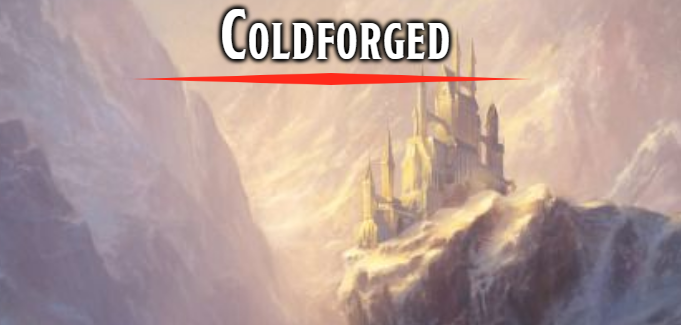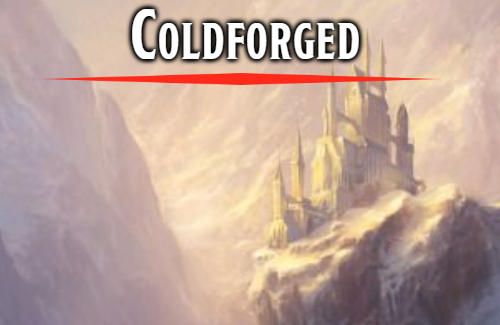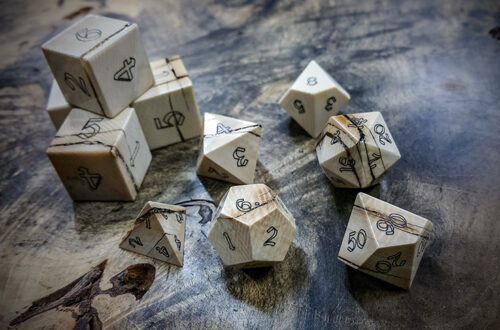
Coldforged: Class Treatment Part II
Each Thursday this year, I focus on a different aspect of the world I’ve created and played D&D in for over 20 years, in the hopes of honing the ideas and cementing enough in place to settle the world in my own mind. This week I talk about how each class of character is viewed by the different regions and kingdoms. This is the second part of three, as this is a much larger concept than I’d originally anticipated!
This is the continuation of part 1
Fighter
- Levisha – The simple warrior is something that those in Levisha strongly respect. The dedication to the craft of war, the defense of settlements and retaliation against evil, as a fighter of Levisha, is treated as a great honor. Many of the inhabitants of the forest, long-lived as they are, tend to spend at least some time in combat training.
Thrax – While barbarians are the Thraxians preferred combatant, the path of a disciplined and trained fighter is not discouraged. Those rare individuals of skill and discipline within the Thraxian communities are often assembled into like groups and tasked with assaulting or defending key locations, either on the battlefield or in the community itself. - Killbarum – The discipline and training of a fighter are cherished in Killbar, and those most disciplined are often taken aside to become part of the Praetorian Guard. Skilled and dedicated to their craft, the fighter is the preferred form of conducting warfare when you can’t get it done with simple wizardry.
- Tyndaria – Tyndarians respect fighters, though they tend to have a much wider variety of styles and skills than many other Kingdoms, often leading to a strange and motley looking army, with a hodgepodge of different levies. Above all, however, stands the mounted fighter, the Knight, the warrior on horseback. While all fighters are known to be formidable, few stand above the knight in the eye of a Tyndarian, being the pinnacle of fighting prowess.
- Drimmak – Fighters of all stripes are fairly common and respected among the Drimmak as well, unsurprisingly for a group of people who are refugees from their homes and fighting to survive. Trained in traditional fighting styles as well as picking up new ones from where they settle, the Drimmak are often referred to and refer to themselves as, as born fighters.
- Brokensail – While a strong arm and a powerful weapon are welcome aboard the ships of the Brokensail buccaneers, most people aboard a ship are desired for their talents with other, more mundane tasks, like fishing, sail repair, and physical labor. Fighting, in and of itself, is not really a skill that is going to be the edge that ensures you are the one who walks aboard the sailing ships crew over anyone else. It’s definitely a nice to have, and if you cannot defend yourself you’re unlikely to last long, but you’ll need a greater set of skills at sea.
Monk
- Levisha – Levishans tend to do a lot of meditating and contemplating existence. This often gives them a leg up when it comes to the greater knowledge of self and power, and the disciplines of the monk come easy to the long-lived races of the forest. While they are not a common sight, they are much more prevalent and understood here in the forest than many other locations in the world.
- Thrax – Monks are a strange thing to the Thraxians. The discipline and time that it takes to truly contemplate the questions of the universe long enough to understand one’s self on a greater level is something that Thrax generally lacks. Still, from time to time one will emerge, often devoted to Decarin, and will be seen as an eccentric and strange individual, likely living alone on a cold mountaintop or on a rocky hillside, generally misunderstood by the greater populace.
- Killbarum – Killbaran Monks are often distrusted, deriving power not from the traditions of the Killbarans arcane ancestors, but from within themselves. Killbarans cannot leave well enough alone, however, and have come to understand that you can combine the inner reflections and the outer knowledge into a single whole, as they refine and reflect upon their creation of the arcane monk.
- Tyndaria – The vast monastery system and religious structure, monks are a daily part of Tyndarian life. Many live in populous places and are treated as well as priests and paladins, seen as the third arm of the church, looking within and understanding the greater perils to the universe. Tyndarians long to send their younger children off to learn the ways of the monk, and to have them return both a learned mind and a powerful fighter.
- Drimmak – Much like Tyndaria, the Drimmak have a religious structure that permeates their society. Unlike the Tyndarians, however, the Drimmack rarely tolerate such introspection, and instead seek the greater good of all, discouraging the path of the monk among their civilization. While the monk looks at what they are good at, the Drimmak must find a way to integrate into the whole. While it is not impossible to be a Drimmak Monk, it is very rare.
- Brokensail – Monks are a treasured and desired prize on a Brokensail Buccaneer vessel. Often quick of both limb and mind, as well as competent in a variety of different skills, the monk is the opposite of what a fighter is. They are skilled combatants that bring a lot of extra skills to the ship, enabling a better and stronger crew overall.
Paladin
- Levisha – Though the way of a paladin is arduous, there are still some within the Levishan people who do tread this path. They are looked upon as strange, a little eccentric, and supremely dedicated. They do not garner some extraordinary level of respect as many of the other professions, but they are seen to be, and understood as, the most stalwart of fighting people.
- Thrax – For many years, the idea of a Thraxian paladin was anathema, and it was thought that the lofty goals and ideas needed to maintain the vows would simply be something a Thraxian could not attain. However, with the introduction of the worship of the god of War among the Thraxians, this has swiftly changed. Thraxian paladins are often a bit more wild and savage than their counterpoints in other cultures, but they are no less dedicated or revered for that dedication than paladins of other cultures.
- Killbarum – Like priests and druids, paladins are not truly trusted in the Killbaran realms. Being sworn to a power that was not under the sway of the Senate of Mages is disturbing to those in power, even now. Sometimes a paladin will arise as a respected and dedicated champion of the people, but they always end up being torn down and disgraced in the long run.
- Tyndaria – Paladins are seen, unlike in Killbar, as the clear and favorite champion of the Kingdoms. Paladins dedicated to every god and belief pepper the countryside and gather in great halls in the cities. Here, their devotion to their cause and the vows that they take are celebrated and looked upon with high honor.
- Drimmak – While priests are held in high regard, and fighters are treated will within the Drimmak society, the combination of the two is seen as something of an anomaly, giving over the furthering of one’s clan and purpose to a sword God is seen as a slight to the family that raised you. Still, there are organizations of paladins within Drimmak that accept those who are without clan and family, those who are on the outer edges of the community and give them reason and purpose.
- Brokensail – Brokensail has little time for paladins. Their generally heavy armor, fervent dedication to lofty goals and tendency to swing first and ask questions later tend to give Paladins little room to breathe on either the open ocean or the claustrophobic docs and town of Brokensail.
Ranger
- Levisha – Rangers are, even among a culture that reveres almost every aspect of existence as an expression of the self, a revered group of people. They are the individuals that hunt down danger, that stride the woods and glens and prevent disaster. They are seen as the pragmatic and necessary path that keeps the forest of Lev secluded and peaceful.
- Thrax – The forest of Thrax is dark and dense, and in this region, the necessity of a guide is almost constant. That said, there is little love or respect for these guides, who are almost always relegated to skirmishing or scouting duties, kept far from the honor the confronting the enemy head-on, bringing the fight to their doorstep.
- Killbarum – Rangers are valued within Kallbarum as scouts and vanguards, but the rest of civilization has little to do with these people who are more at home in the woods and hills than in the stone and mud cities that dot the Killbaran countryside. They are in demand to protect the private woods and exclusive country villas that the wealthy retreat to relax, it is hard to find a ranger good enough to be worth it and settled enough to want the job.
- Tyndaria – Rangers settle in rough and tumble out of the way towns all across the 10 Tyndarian kingdoms, and are respected and valued for their knowledge of local terrain, dangers, and wildlife. Each town or village often has a half dozen people who serve as trusted guides and rangers for the populace as well as providing protection along the fairly wild roads between towns.
- Drimmak – Underground, there is little need for rangers. With the ability to understand where they are and where they are going, many Drimmak simply do not understand the necessity of rangering until they are exposed to the wild and unbroken wilderness of their surrounding areas later in life, often leading to a dearth of those who wish to become a ranger from a young age. It is rare, and mostly seen as frivolous, to see a Drimmak become a ranger.
- Brokensail – Rangers, much like Paladins and fighters, are completely unneeded and unwanted on the ships of Brokensail. The ocean can be navigated well enough with tools and a bit of good learning and is pretty much flat and featureless unless a good storm breaks out. rangers simply have no job within a Brokensail vessel.


